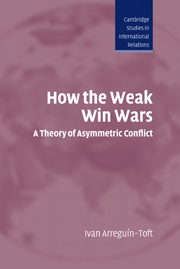Book contents
- Frontmatter
- Contents
- List of figures
- Preface
- Acknowledgments
- List of abbreviations
- 1 Introduction
- 2 Explaining asymmetric conflict outcomes
- 3 Russia in the Caucasus: the Murid War, 1830–1859
- 4 Britain in Orange Free State and Transvaal: the South African War, 1899–1902
- 5 Italy in Ethiopia: the Italo-Ethiopian War, 1935–1940
- 6 The United States in Vietnam: the Vietnam War, 1965–1973
- 7 The USSR in Afghanistan: the Afghan Civil War, 1979–1989
- 8 Conclusion
- Appendix
- References
- Index
- CAMBRIDGE STUDIES IN INTERNATIONAL RELATIONS
7 - The USSR in Afghanistan: the Afghan Civil War, 1979–1989
Published online by Cambridge University Press: 22 August 2009
- Frontmatter
- Contents
- List of figures
- Preface
- Acknowledgments
- List of abbreviations
- 1 Introduction
- 2 Explaining asymmetric conflict outcomes
- 3 Russia in the Caucasus: the Murid War, 1830–1859
- 4 Britain in Orange Free State and Transvaal: the South African War, 1899–1902
- 5 Italy in Ethiopia: the Italo-Ethiopian War, 1935–1940
- 6 The United States in Vietnam: the Vietnam War, 1965–1973
- 7 The USSR in Afghanistan: the Afghan Civil War, 1979–1989
- 8 Conclusion
- Appendix
- References
- Index
- CAMBRIDGE STUDIES IN INTERNATIONAL RELATIONS
Summary
The Afghan society may now be regarded a murderous society … We have become soulless and dry, no longer beings of care and love, but brutal and fierce animals. It is not right to name a society murderous, but the Afghan society may be called so … The state is a state of killing, not only in the battlefield but also in the lanes and streets of cities where there is no state of war. No one feels secure, and because of this many families have fled abroad.
Hassan Kakar (1995)In Afghanistan I served at Ghazni … Life in the unit was fairly calm, unless we were involved in operations, when everything was different … We didn't see any friendly Afghans anywhere – only enemies. Even the Afghan army was unfriendly … Everyone around us was an enemy. I remember an intense feeling of anger toward the rebels because so many of our guys were getting killed. I wanted revenge.
Then I began to doubt the goals and methods of international aid. I had a difficult time deciding what I really believed. I just knew what I had to say during the political instruction meeting: that we were fighting “American aggression” and “Pakis.” Why had we mined all the approaches to the regiment? I asked myself. Why were we aiming our machine guns at every Afghan? Why were we killing the people we came here to help?
Whenever a peasant was blown up by a mine, no one took him to the medical unit. […]
- Type
- Chapter
- Information
- How the Weak Win WarsA Theory of Asymmetric Conflict, pp. 169 - 199Publisher: Cambridge University PressPrint publication year: 2005



